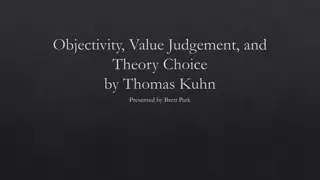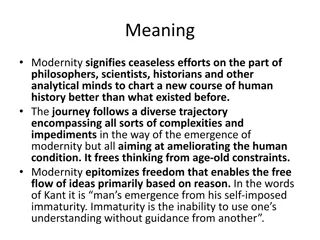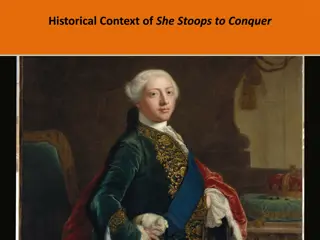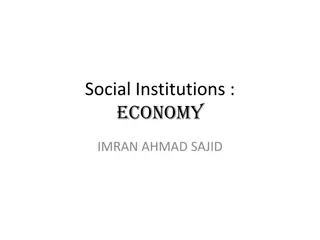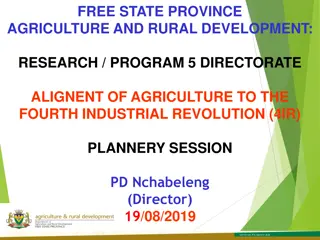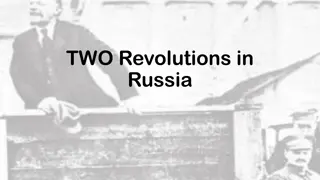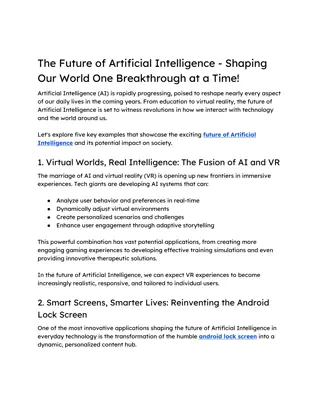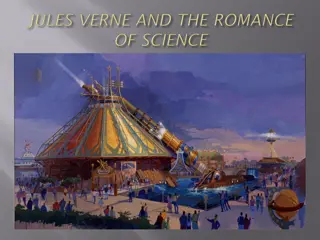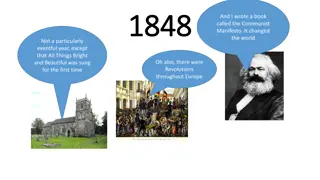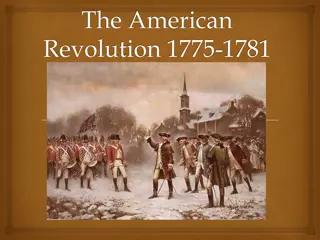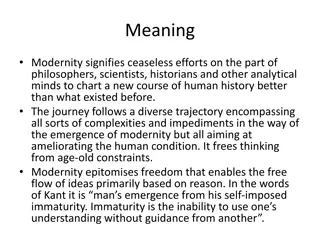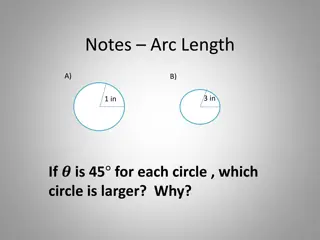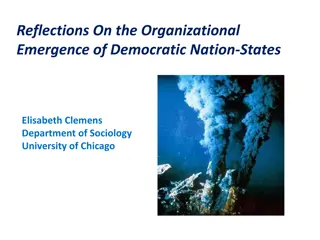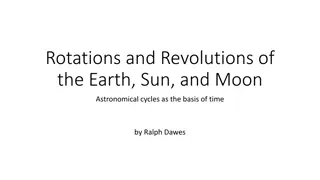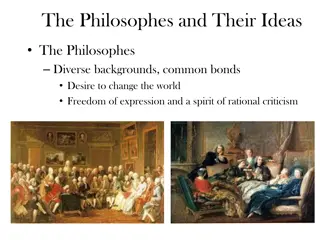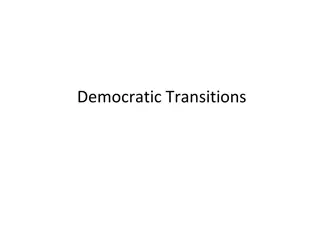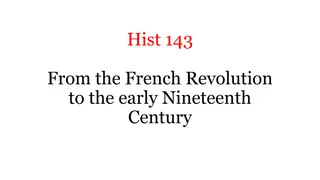Evolution of Industrial Revolutions Towards Industry 4.0
Key Enabling Technologies (KET) play a crucial role in revitalizing production systems by fostering technological advancements through research experiences. Industry 4.0 signifies a transformative phase with new technologies, production factors, and work structures reshaping the manufacturing landsc
13 views • 60 slides
Evolution of Technologies: A Journey Through Revolutions
Explore the evolution of technologies through different revolutions - from the agricultural revolution to the emerging technologies of the future. Learn about the profound changes in economic relationships and technological conditions that have shaped human society. Discover the role of data, progra
0 views • 58 slides
Understanding the Basic Concept of Human Rights in Modern Jurisprudence
Human rights are natural and inalienable, essential for human life, based on universal principles. The concept of human rights is both simple and complex, requiring societal development and political will for implementation. Rooted in natural law theory, human rights have evolved from natural law to
1 views • 24 slides
Objectivity, Value Judgement, and Theory Choice in Science
Thomas Kuhn's work explores the subjective elements in theory choice, highlighting that theory selection is not solely based on objective algorithms. He discusses the structure of scientific revolutions, where science shifts between normal and revolutionary phases. Kuhn's ideas have faced criticisms
6 views • 19 slides
Exploring the Significance and Origin of Modernity
Modernity embodies the relentless pursuit of progress in human history, driven by freedom, reason, and the desire to improve the human condition. It traces back to the European enlightenment of the 18th century and is associated with philosophical, scientific, and social revolutions. The concept of
0 views • 19 slides
Historical Context of "She Stoops to Conquer" During King George III's Reign
The play "She Stoops to Conquer" is set during King George III's reign, a period of significant social change in Britain. The Agricultural and Industrial Revolutions were transforming the country, leading to urbanization and class divisions. The interactions between city-dwellers and country folk in
0 views • 7 slides
Exploring the Vibrant Era of the Swinging Sixties
Delve into the dynamic decade of the Swinging Sixties, a period marked by cultural revolutions, iconic figures like Martin Luther King Jr. and President John F. Kennedy, and significant events that shaped history. Discover the socio-economic landscape, key individuals, and pivotal moments that defin
0 views • 25 slides
Evolution of State Formation and Nation-Building: A Historical Perspective
Explore the intricate evolution of state formation and nation-building throughout history, examining various patterns and phases from the origins of the state to the emergence of nationhood. Delve into the critical intersections between state institutions, nation-building processes, and the idea of
0 views • 17 slides
Evolution of Economic Institutions Through Technological Revolutions
Economies of modern nations have evolved over centuries through technological revolutions. The Agricultural Revolution led to the creation of a distinct economy with surplus production, job specialization, and trade. The Industrial Revolution further transformed production, leading to significant in
1 views • 35 slides
Study Design for Units 3 and 4 Revolutions 2022-26 Workshop
Explore the study design and implementation for Units 3 and 4 Revolutions focusing on key areas like causes and consequences of revolutions in countries such as Russia, China, America, and France. The workshop emphasizes acknowledgment of traditional custodians and offers teaching ideas, questions f
0 views • 29 slides
Evolution of Industrial Revolutions in Agriculture: Free State Province Research & Program Director's Plannery Session
The presentation delves into the alignment of agriculture with the Fourth Industrial Revolution (4IR) in the Free State Province, tracing the evolution from the first to the third industrial revolutions. It discusses the advantages, disadvantages, impacts, competitiveness, opportunities, and threats
0 views • 31 slides
Nicolaus Copernicus: Renaissance Astronomer and Mathematician
Nicolaus Copernicus, born on 19th Feb 1473 in Torun, Poland, was a key figure in the Renaissance era. He proposed the revolutionary Heliocentric Theory and argued that the planets revolved around the Sun. His major work, "On the Revolutions of Heavenly Spheres," challenged the geocentric view of the
0 views • 23 slides
The Impact of the Haitian Revolution: Contrasting Perspectives
Explore the distinctive features of the Haitian Revolution and how it diverged from the American and French Revolutions. Learn about Haiti's shift from a lucrative French colony to an independent nation under the leadership of slaves, revealing a unique chapter in revolutionary history.
0 views • 8 slides
The Russian Revolution: A Historical Overview
The Russian Revolution of 1917 was a pivotal moment in world history, marked by a series of events including the March and October Revolutions, the rise of the Bolsheviks led by Lenin, and the subsequent Russian Civil War between the Whites and the Reds. The revolution saw the overthrow of the Tsari
3 views • 26 slides
Latin American Revolutions: Causes, Events, and Impact
Latin American Revolutions from 1791 to 1825 marked a period of significant upheaval as colonies in the Western Hemisphere sought independence from Spanish rule. Driven by factors like inspired by other successful revolutions, Spanish mercantilist policies, and unequal wealth distribution, these rev
1 views • 12 slides
The Berlin Revolutions of 1848: A Historic Perspective
The Berlin Revolutions of 1848 were part of a series of widespread uprisings across Europe, driven by a mix of liberal and working-class goals. The revolutions aimed to challenge the existing autocratic political structure in the German Confederation and the Austrian Empire. Despite initial hopes fo
1 views • 14 slides
Two Revolutions in Russia: The March and November Revolutions of 1917
The year 1917 witnessed two significant revolutions in Russia - the March Revolution leading to the abdication of the Tsar and the formation of the Provisional Government, followed by the November Revolution where Lenin's Bolsheviks overthrew the Provisional Government and established the world's fi
0 views • 20 slides
The Future of Artificial Intelligence - Shaping Our World One Breakthrough at a Time!
Artificial Intelligence (AI) is rapidly progressing, poised to reshape nearly every aspect of our daily lives in the coming years. From education to virtual reality, the future of Artificial Intelligence is set to witness revolutions in how we intera
0 views • 5 slides
Impact of the Industrial Revolution on Society and Ideals
The Industrial Revolution, spanning from 1760 to the late 1800s, revolutionized manufacturing, leading to improved living standards in the developed world. Mechanization, new energy sources, steam engines, and railways transformed production and transportation, fostering innovation. Despite the Fren
1 views • 15 slides
Challenges and Opportunities of Moral Revolution in Indonesia
The need for a moral revolution in Indonesia to address societal issues like corruption, conflict, and intolerance. Contrasting mental and moral revolutions, the focus is on behavior change to build a humane society with healthy moral values. Initiatives and discussions highlight the urgency of tran
0 views • 13 slides
Exploring National Identity and Revolutionary Ideals in European History
In this discussion, we delve into Karl Marx's beliefs in the Communist Manifesto, the lack of Communist revolutions in the 19th century, the role of national identity in societies, and the concept of imagined communities as outlined by Benedict Anderson. Through analyzing historical events and schol
2 views • 10 slides
A Comparative Analysis of the American and French Revolutions
The American and French Revolutions were significant events during the late 18th century. Both revolutions were driven by Enlightenment ideals, concern for liberty, and push for new governance but had differences in violence, outcomes, and influence. While the American Revolution led to independence
0 views • 9 slides
Learning Recovery Notes and Worksheets for Monday
Update your Table of Contents and prepare for Learning Recovery on Monday with various worksheets and notes related to protests, revolutions, vocabulary, and more. Ensure all materials are organized and accounted for to facilitate efficient learning and review.
0 views • 20 slides
The American Revolution: Causes and Events
The Age of Revolutions in the late 18th century saw the American Revolution unfold, driven by factors like Enlightenment ideals, taxation disputes, and events like the Boston Massacre and Tea Party. The British government's actions and the formation of the First Continental Congress in 1774 further
0 views • 43 slides
World History Standards and Scope for Grades 10-12
This document outlines the standards and scope for Grade 10 World History, covering topics such as the foundations of modern world history, historical research, ethical principles in ancient philosophies, revolutions, and the Industrial Revolution. Students will analyze key events and philosophies s
0 views • 20 slides
The Evolution of Modernity: A Discursive Exploration
Modernity symbolizes a continual pursuit by intellectuals to reshape human history for the better, breaking free from old constraints to enhance the human condition. Rooted in the European Enlightenment of the 18th century, it embodies the freedom to reason publicly, leading to new philosophical ide
0 views • 10 slides
Exploring Democracy, Government Ideals, and Global Impact: A Comprehensive Analysis
Delve into the roots of American democracy, government ideals, and political scenarios in the Middle East and North Africa. Analyze the impact of the Arab Spring, U.S. responses, and Trump's immigration ban within the region. Reflect on governmental structures, revolutions, and foreign policy implic
0 views • 76 slides
Understanding Arc Length and Angular Velocity in Circles
Explore the concept of arc length in circles and learn how to calculate it using the formula s = rθ. Discover the relationship between linear speed and angular velocity in circular motion and practice applying formulas to solve problems. Dive into converting revolutions to radians and mastering the
0 views • 19 slides
Dynamics of Democratic Nation-States and Organizational Change
Insights on the emergence of democratic nation-states, the role of networks in democratic revolutions, challenges in defining democratic governance, and the impact of redundancy on organizational stability and change are explored in this thought-provoking discussion by Elisabeth Clemens.
0 views • 25 slides
Exploring Conflict and Compromise in History Through National History Day 2018
National History Day 2018 focuses on the theme of Conflict & Compromise in History, encouraging students to delve into topics such as failed compromises leading to revolutions, the Vietnam Generation, and conflicts like the Troubles in Ireland. Through research, students will explore historical cont
0 views • 18 slides
The Evolving Landscape of Human Sexuality: A Cultural Reflection
Exploring the complexities of human sexuality within cultural, ecclesiological, and societal contexts, this content delves into traditional teachings, modern challenges, and the impact of cultural revolutions on sexual norms and behaviors. The narrative discusses the changing dynamics of courtship,
0 views • 22 slides
The Struggle for Italian Unity: Nationalism and Obstacles
The journey towards Italian unity faced obstacles such as foreign rule, local princes, and Austrian dominance. Nationalists like Mazzini and Cavour played pivotal roles in unifying Italy, overcoming challenges through secret societies and shrewd political tactics. The movement for Italian unificatio
0 views • 19 slides
Lessons from Gordon Tullock: A Legacy of Iconoclasm
Gordon Tullock, an influential economist at George Mason University, challenged conventional wisdom by applying economic principles to politics. He viewed politics as a ruthless game of self-interest, analyzing dictatorships and revolutions with a cynical yet insightful perspective. Tullock's iconoc
0 views • 6 slides
Understanding Collective Behavior in Social Work
Collective behavior encompasses spontaneous and unstructured group reactions to common influences in ambiguous situations. It includes phenomena like mobs, crowds, panics, social movements, and revolutions. Such behavior is characterized by its episodic, emotional, and unpredictable nature, often la
0 views • 14 slides
The Earth, Sun, and Moon: Rotations and Revolutions Explained
Discover the complexities of time measurement based on astronomical cycles involving the Earth, Sun, and Moon. Learn how the varying lengths of sidereal and solar days relate to the Earth's rotational speed, its elliptical path around the Sun, and the concept of leap years to adjust our calendar sys
0 views • 23 slides
Enlightenment Thinkers and Their Impact on Society
Explore the ideas and influence of key Enlightenment thinkers such as Montesquieu, Condorcet, Voltaire, and John Locke. Discover their groundbreaking works and beliefs on freedom, governance, equality, and religious tolerance, which shaped the American and French revolutions and continue to resonate
0 views • 31 slides
Overview of Sixteenth Century English Poetry and the Renaissance
The introduction provides insights into sixteenth-century English poetry, the Renaissance era, and the defining characteristics of the period. It delves into the intellectual, religious, political, and social contexts of the time, highlighting key figures and movements like the Reformation, the Grea
1 views • 12 slides
Nationalist Revolutions in Latin America: 1789-1900
Rising nationalism in Latin America during the late 1700s and early 1800s led to revolutions against European colonial powers. Inspired by Enlightenment ideals and events such as the American and French Revolutions, Latin Americans sought self-government and independence. The Haitian Revolution in 1
1 views • 28 slides
Overview of Democratic Transitions and Revolutions
Explore the historical context of democratic transitions from the 1940s to 2020, including the waves of democracy as described by Huntington. Learn about bottom-up and top-down transitions, exemplified by mass protests in East Germany leading to German reunification. Delve into the complexities of p
0 views • 73 slides
Europe from French Revolution to Revolutions of 1848
From the French Revolution to the early nineteenth century, Europe saw significant political changes, including the rise of Napoleon Bonaparte, the Congress of Vienna in 1815, and subsequent revolutions like the 1830 French Revolution and the Revolutions of 1848 that spread across Europe, shaping th
0 views • 6 slides



